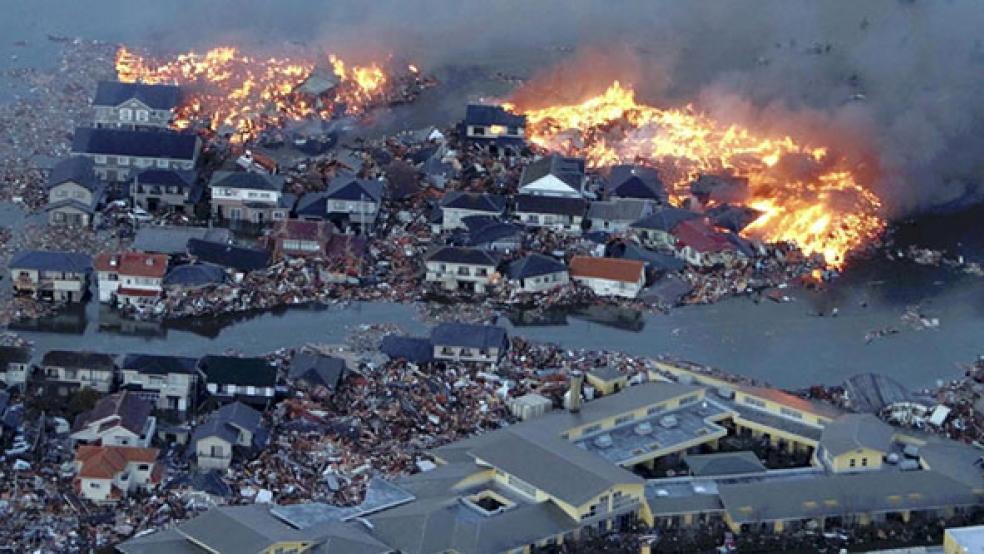One major catastrophe would be a tragedy. Japan faces three: an earthquake, a tsunami, and a potential nuclear meltdown. While the suffering of the Japanese people is the greatest concern, the economic and financial impact of the crisis may be just beginning.
"This may be the signal moment that seals the decline of the Japanese economy,” said Daniel Altman, an economist with Dalberg Global Development Advisors. “The country already has an enormous debt burden … The recovery from the earthquake will suck up trillions of yen in public and private resources.”
Japan’s Nikkei stock index has fallen around 16 percent from its close Friday to its close Tuesday. In the U.S., stocks opened sharply lower Tuesday morning and even after recovering some of those losses, major indexes were down about one percent in mid-afternoon. Oil prices fell to their lowest level in weeks amid concerns about reduced demand from the world’s third largest economy, after the U.S. and China, and agricultural commodities also tumbled. There are other effects as well.
Possible: Dumping U.S. Treasuries
To finance its recovery efforts, Japan may need to liquidate some of its holdings in foreign sovereign debt. This includes some of its $882.3 billion of U.S. Treasury securities. Japan is the second largest foreign holder of U.S. debt, after China, holding 19.9 percent of the debt held by foreign countries. Bill Gross, manager of the world’s largest bond fund, has already cashed out of the U.S. Treasury market The Federal Reserve plans to end its second round of quantitative easing, aka QE2, this summer. Japan’s sale of U.S. debt would put additional pressure on the Treasury market, which would force interest rates higher. Not only would it be become more onerous to finance the Federal debt, borrowing rates for corporations and consumers would also rise.
Japan’s Exports in Jeopardy
Japan has a nominal GDP of around $5.5 trillion. The earthquake and tsunami hit relatively less populated regions of Japan. By some estimates, the ravaged area accounts for around 5 percent of Japan’s economy. However, plans for rolling blackouts would cripple industrial activity in a much wider area. Japan’s $765 billion in exports also could take a hit. Internal weakness could send ripples globally. Japan, the fifth largest buyer of foreign goods, could see its approximately $637 billion in annual imports shrink.
For now, Arthur J. Alexander, an adjunct professor of Asian Studies at Georgetown University who studied the effects of the Kobe earthquake in 1995, predicts the global impact will be small. “Modern economies have tremendous redundancies,” he says. But he adds that he less optimistic than he was a few days ago. “The problem is electricity output, affecting Tokyo and other regions. … electricity powers railroad, delivers oil, brings people to work. This is a real issue and this is what we have to work on.”
Volatile Oil Prices
In recent months, the price of oil soared due to unrest in the Middle East. Oil prices recently hit a crescendo on fears that a March 11 “Day of Rage” would disrupt oil production in Saudi Arabia. These fears were overblown. Oil prices fell and U.S. stocks rallied on March 11, even as news broke of Japan’s catastrophe. With oil production seemingly unscathed and the risk of global economic deceleration rising, oil prices should continue to fall in the near term. However, there could be longer-term prospects for rising prices as escalating fears surrounding the Fukushima Daiichi Nuclear Power Station)make the nuclear energy alternative less attractive. Japan’s nuclear crisis has reminded the world of the scars left by Chernobyl and Three Mile Island.
Fear and Loathing in the Markets
In the face of fear and uncertainty, stocks tend to overreact, which some experts say is what is happening now. But the longer-term impact is uncertain. “What we’re seeing right now is classic fear-selling, said Douglas Holtz Eakin, former Congressional Budget Office Director and President of The American Action Forum, a conservative think tank. “However, if there is a major radiation event, that would be very bad for Tokyo, would mean big financial market shocks, which would then harm the U.S. recovery.”
Gus Faucher, director of macroeconomics for Moody’s analytics said the firm hasn’t changed its forecast for the U.S. “In the near term, the U.S. may receive a slight benefit from some production moving from Japan to the U.S.,” he said. “The biggest long-run impact would come if (and it’s a big if) there is a shift away from nuclear power toward fossil fuels, which would raise long-run energy costs, weighing on growth. However, it’s too early to say if this will actually happen.”
-Michelle Hirsch and Kathleen Deveny contributed reporting for this article.
Related Links:
A Critical Moment for Japan’s Economy (MarketWatch)
Nuclear Power Safety: After Japan’s Fukushima Plant Crisis (Huffington Post)


